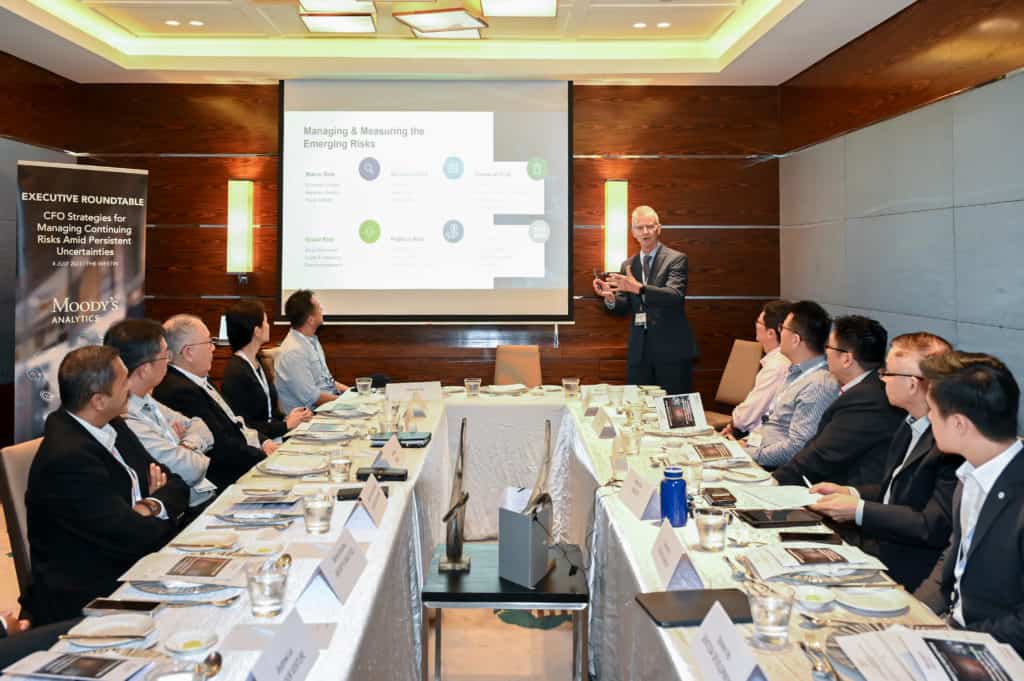Businesses face a tremendous number of uncertainties. And this list is only getting longer daily, with many uncertainties remaining persistent.
The pressure is on financial leaders to grasp the ongoing uncertainties and pave the way for their businesses to move forward. It is a tall ask, considering that today’s macroeconomic risks can come from unexpected directions.
Financial leaders are equally tasked to improve resilience. The pandemic showed how complex and fragile the global supply chains are, and many finance leaders are looking for ways to de-risk or strengthen business resilience.
At a recent roundtable discussion, co-organised by FutureCFO and Moody’s Analytics senior finance executives dissected the issues and concerns that face Singapore-based finance leaders must navigate amid the continuity volatility and uncertainties of markets around the region and globally.

Navigating uncertainty
Many times, in the past, a market downturn would be traced to a major issue or catalyst. The usual response for finance leaders is to batten down the hatches, survive the ensuing uncertainty, and then be able to succeed when the market turns.
Not today. Alicia Yang, senior director at Moody's Analytics, noted how the world has become interconnected, with risks in one part of the world now affecting businesses across the globe.

"First, we had the collapse of the SVB and credit concerns in Europe. Next, we have concerns about the decoupling of the U.S. and Chinese economies and the impact of geopolitical conflicts between countries. Finally, we are facing issues post-COVID-19," said Yang.
She noted that historically companies look to reduce costs and increase profitability in a market downturn. "Now, it is not possible. You need constant monitoring of your economic outlook because then you can adjust your risk management strategy that will help you mitigate third-party risks."
Francis Tan, chief financial officer for Asia Pacific at JBT Corporation thinks that finance leaders are tasked with risk management, and he sees it as a heavy responsibility.
"Everyone else in the company is trying to meet their KPIs, grab whatever they can find on the table, and pretty much have zero already got a risk, right? From our perspective, we see the company demand, and it's about securing supply, finding the right customers, and, you know, all of my colleagues out there trying to choose deals," he adds.
Steve Cochrane, the chief APAC economist at Moody's Analytics, said there were "a lot of risks out there." He remained optimistic, although he predicted the next six to 18 months would be "touch and go" for many businesses.

To make sense of the risks, Cochrane noted that it was becoming more important to have a firm handle on the economies of different countries. This means finance leaders need to consider various data sources.
For example, Cochrane observed that very few economies in the world "are in recession at the moment." "There is a lot of talk about recession, many people expect that we're heading into recession, but we actually don't see it yet."
"The main message is the remarkable amount of resilience in the global economy. But there are a lot of risks that will linger," said Cochrane, further supporting the case for better monitoring of all types of data.
Financial hurdles
During the discussion, participating financial leaders pointed to other areas adding additional challenges to their operating environments.
One is the occurrence of black swan events like a pandemic and natural calamity, adding more uncertainties. Participants noted that this could increase material costs and impact currencies, leading to price fluctuations.
For Danny Yap, the director of finance at Chloride Batteries SE Asia, it is not so much price fluctuations but interest rate risks.
Duane Ho, the chief financial officer at Oceanus Group, noted that CFOs were increasingly asked to manage business risks so that the rest of the organisation could focus on revenue, growth, and profitability. One such risk is increased regulatory scrutiny and more stringent compliance requirements backed by expensive fines, added other participants.

Benny Kesuma, head of the corporate sector (APAC & ME) for the global industry practice group at Moody's Analytics, stated that CFOs are being asked to manage third-party risks that are sometimes not in their control. He added that this expands the scope of the CFOs’ remit, but it also means CFOs need to expand their data sources.
"I think what’s important is to find out what data is out there to augment your data analysis," Kesuma added. This is where companies like Moody’s have been expanding their portfolio.
Moody’s, he noted, is well known for its counterparty credit risk analysis. However, the acquisition of Bureau van Dijk, which specialises in third-party data, allows companies to find out information such as the company's shareholders and its subsidiaries and financial performance.
"So, we have a huge set of data that is essentially third-party data meant to augment what internal information you have," said Kesuma. Such information is critical for senior decision-makers but allows them to quickly understand whether "they are working with a sanctioned entity and be fined."
Moody's Analytics’ Cochrane agreed that today’s CFOs and finance leaders are being asked to shoulder more risk management demands. At the same time, they also need to keep an eye on shifting macroeconomic risks, such as whether China will recover well after coming out of strict lockdown.
"There are so many multiple issues that face the Chinese economy, for example. It could work to bring about some additional supply chain constraints, which can then impact inflation. So, to me, I always put inflation and interest rates at the top," Cochrane observed.
Talking about the pain points of being a CFO, Tan says, "I think the very first important step is to make a conversation. Because people are already fulfilling their roles and responsibilities 24 hours a day. The management’s role, I think is just trying to draw the line between the decision-making process and also coming up with setting limits."
Achieving clarity
Participants noted that most, if not all, businesses are aware of the value of analysing the various macro and business factors.
Ultimately, it comes down to the data and information you have at hand. It’s "what keeps me up at night," said Oceanus Group’s Ho.
He called for faster forecast scenarios. "Gone are the days when you do it once a month. Personally, I find that the information that comes in is not quick enough. Even data capturing is not quick enough and not efficient enough because it's done in Excel spreadsheets."
A delegate pointed to the challenges in the data flow, a key reason why his organisation decided to consolidate all the data into a single database "to make sure that we’re running efficiently while addressing some of the points of moving data."
One delegate said his organisation encouraged team members to engage with others for cross-functional communications. "Sometimes you are not aware of how a big shift in the supply chain, for example, can impact your (risk) exposure," he opines.
Kesuma noted that companies need to focus on more than just data. "Data is one component of the whole [data transformation] story." He explained that CFOs see value in a single view of their customers or a single view of their supply chains.
AI: A CFO’s ally?
Sifting through the towering amounts of data is no walk in the park. At the same time, finance leaders must contend with privacy and ensure they work with clean data.
This is why Moody’s Analytics’ Yang believes AI will play a critical role. "It's getting a little bit more complicated because the results [of data analyses] are all correlated. AI can give you the intelligence to combine the data together to give you an actual holistic view, and in Moody’s, we focus a lot on ensuring hygiene and reliability in our data," said Yang.
She added that Gen AI extends this benefit by allowing you to easily combine various (data sets) aspects.
"Well, AI is going to change how we monitor economic conditions because it’s going to help us more quickly understand (evolving situations), such as COVID-19," said Moody’s Analytics’ Cochrane.
"This will be a game changer. There’s no question AI will change how we monitor," he claimed. To a large extent, it will also change how CFOs contribute to their organisations, he concluded.
For more information about Moody’s Analytics risk management solutions, visit https://www.moodysanalytics.com/




